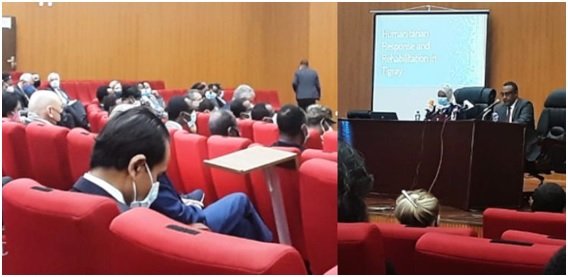Ministry holds high-level consultative meeting with government agencies, stakeholders and humanitarian partners operating in Tigray (June 3, 2021)
Deputy Prime Minister and Foreign Minister, H.E. Demeke Mekonnen has presided over the consultative meeting that aimed at shedding light on the progress achieved and the challenges observed regarding outstanding issues in Tigray that followed the law enforcement operation in the region.Although challenges remain to be tackled in many intervention areas in the region, Mr. Demeke said, denying the progress achieved so far by sticking to unfounded claims is morally, politically, and legally unacceptable.Ambassadors of donor countries, government officials, UN representatives, humanitarian partners, and Government officials, including Minister of Peace, H.E. Muferihat Kamil, Minister of Defence, H.E. Kenea Yadeta, Head of Tigray Region Administration, Dr. Abraham Belay, Director General of Information Network Security Agency, Dr. Shumete Gizaw, Commissioner for the National Disaster Risk Management Commission, Mr. Mitiku Kassa, and General Alemeshet Degefe have participated in the meeting.To create clarifications on what has been done so far and to be on the same page on outstanding issues in the region, H.E. Ms. Mufariat Kamil has tabled a presentation touching upon various intervention areas in the region.Regarding the humanitarian assistance, she reiterated that the government, with a lion’s share, has addressed the humanitarian needs of 4.5 million people in the first round of aid while a total of 4.9 million people were reached in the second and third rounds.She also spoke about the efforts to address 1.9 million IDPs in the region highlighting that the government has taken the initiative to facilitate dialogue with the Amhara and Tigray regional states to resettle IDPs that were displaced from Western Tigray.Aside from establishing centers for mobile health services, the minister said 46.5% of the health centers in the region are made functional so far.Downplaying some of the recent concerns on using schools for military purposes, she said some schools have been occupied by IDPs as makeshift shelters where the government is working to relocating them to better areas.The government is providing seeds and farming equipment to farmers, where 70%of the land has been made ready for cultivation involving 1.2 million farmers in the region.Speaking about the rehabilitation and reconstruction of destroyed infrastructures and disrupted public services, she said, some factories in the region, including textile and cement factories have already started operation.Reiterating the government’s policy of zero tolerance to human rights abuses and appreciating the joint EHRC-UN investigations, she said the military, the federal and regional justice systems are working in concert, where 60 suspected soldiers were brought to justice, of whom some are convicted and sentenced subsequently.Among the challenges observed in the region, the most crucial ones are the unverified reports that misrepresented the facts on the ground and misunderstandings by humanitarian partners on the security concerns of military personnel at some checkpoints as facts for denial of access to the region.Ethiopian Minister of Defence, H.E. Kenea Yadeta, on his part, confirmed that the process of withdrawing Eritrean troops has already begun.Despite the media hype, he said TPLF is not in a position to fight the Ethiopian Defence Forces although it sparks sporadic clashes at very few pocket areas.Adding to what the minister has said, General Almeshet Degefe, said by causing troubles in some pocket areas, such as the West of Maichew, Gura, and Temben, the terrorist group has tried to impede access to humanitarian support envisaging famine in the areas as a political strategy to garner support from aggrieved people.The Ethiopian Defense Forces are well known for taking military discipline very seriously as witnessed in serving in various UN peacekeeping missions, he said adding that there is no reason for our soldiers to go wild and be lenient when it comes to protecting the well-being of our own people in Tigray.Dr. Shumete Gizaw, Director General of Information Network Security Agency explained the types of communication tools that are allowed to be in the hands of civilians and stressed that quests by the humanitarian agencies to possess gadgets that should only be restricted to military personnel are not acceptable.He said quests to possess communication equipment shall be entertained if the equipment is in alignment with the mission of the aid agency, does not compromise national security and can make services more efficient.He also questions why the government has been reluctant to announce the misuse of privileges by some aid agencies that were caught while attempting to transport ammunition to the terrorist group and unduly repressing and firing Ethiopian staffers in the organizations.Dr. Abraham Belay, Head of the Tigray Region administration, on his part, affirmed that the issue of access to the region, except some pocket areas, has been granted and said he could not understand the motives of reports that denied the reality on the ground.He said the federal and regional governments have been using their scarce resources to rebuild most of the infrastructures and public services, such as telecommunication, electricity, banking, and financial services that were destroyed by TPLF.What we need now is material and financial support, he said adding that many IDPs in the region need to go back home armed with basic facilities.The meeting also discussed the possibilities of opening Shire and Humera Airports, including the modalities required to extend visas granted to aid agencies.In delivering concluding remarks, Mr. Demeke said the government will facilitate similar consultative platforms soon adding that it is committed to getting the region into normalcy by making an all-inclusive dialogue with stakeholders.




Leave a Reply
Want to join the discussion?Feel free to contribute!